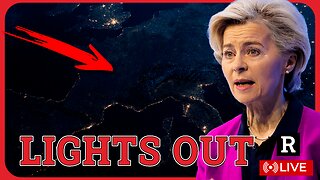Premium Only Content

The Science of Peace
Does the War Party really dominate the world—or is it accelerating its own extinction? There is a world movement to end colonialism and war, which the LaRouche Movement helped to initiate 50 years ago, now expressed in the 150-nation economic development revolution centered around the BRICS-Plus and the Belt And Road Initiative.
The last decade tells the story. In January, 2013, Helga Zepp-LaRouche and the Schiller Institute held an international conference at New York City’s Riverside Church, site of Martin Luther King’s April 4, 1967 speech opposing the Vietnam War. The conference was titled “A New Paradigm To Save Mankind.“ During that conference, Zepp-LaRouche exhaustively detailed projects in the Mediterranean Basin, the Bering Strait, in the Arctic, in Southwest Asia (including an extensive proposal for the greening of Iraq,) in North and South America, and in the massive TransAqua project for Central/Northern Africa.
Notably, she concluded her presentation by speaking about cooperation on the frontiers of science:”We need to go to higher energy-flux-density energies, and technologies based on those, and we need to move consciously into a new era of mankind, which must be guided by what (astrophysicist) Kraft Ehricke called ‘the extraterrestrial imperative,’ as the conscious next phase of the evolution of mankind. This must be guided by the power of reason, and the wisdom of the moral law within ourselves, as Kraft Ehricke put it.” An independent Council of Reason to advocate that the most advanced technologies be used for the greatest advancement of mankind, and not war, is the urgent requirement of this moment.
China’s President Xi Jinping proposed the One Belt, One Road Initiative, in September of 2013, and famously invited American President Barack Obama to join it, which Obama refused to do. In September of 2023, at the 10th anniversary of the Belt And Road, the United States did not congratulate China, but released a White House memorandum that read, “the Governments of the Kingdom of Saudi Arabia, the European Union, the Republic of India, the United Arab Emirates (UAE), the French Republic, the Federal Republic of Germany, the Italian Republic, and the United States of America…commit to work together to establish the India – Middle East – Europe Economic Corridor (IMEC).“
The Chinese, however, saw this proposal in the context of their “win-win” Belt and Road policy. As one commentator put it, “China is already running the Piraeus (Greece) Port with great success (plus building railways to Serbia and Hungary), Haifa Port (in Israel), and is involved in the Saudi Land-Bridge project, Emirates' rail project, and ports in Saudi Arabia and the UAE. So, if there are new American and European investments, they would benefit China…. In any case, why would anyone who is sane think this is an {alternative} to the Belt and Road Initiative?”
Can NATO’S worldwide conflicts, whether in South America, Ukraine, the “Middle East,” Georgia, and, of course, the Indo-Pacific theater, be viewed from a higher standpoint, as a whole, as lethal reactions to a world process that they cannot stop—the liberation of humanity through economic development? Can economic development, powered by advanced productive technologies, become the new name for peace?
Tonight, EIR’s Bill Jones will discuss how the groundbreaking work of the Russian scientist Vladimir Vernadsky, and the physical economy of Lyndon LaRouche, hold the key to peace through economic development.
-
 LIVE
LIVE
BonginoReport
2 hours agoFAKE News In A Downward Ratings Spiral - Nightly Scroll w/ Hayley Caronia (Ep.36)
3,824 watching -
 LIVE
LIVE
The Jimmy Dore Show
37 minutes agoTrump Tariffs Working As Planned? Trump Open to Raising Taxes on the Rich! w/ Stephen Gardner
5,811 watching -
 DVR
DVR
Kim Iversen
3 hours agoEpstein Victim DEAD at 41, Ruled Suicide. Suspicious? | The Left DOUBLES DOWN on Extremism
3.3K16 -
 LIVE
LIVE
vivafrei
9 hours agoLive with Myron Gaines - from Global Politics to the "Manosphere" & Everything in Between
7,273 watching -
 LIVE
LIVE
Rebel News
4 days agoELECTION NIGHT LIVE: Rebel News Canada coverage with Ezra Levant, Sheila Gunn Reid & Special Guests
1,610 watching -
 1:28:38
1:28:38
Redacted News
2 hours agoEUROPE'S BLACKOUT CRISIS "Nothing works!" & Israel's Silent War vs Iran just got worse | Redacted
66.9K68 -
 1:07:19
1:07:19
Candace Show Podcast
2 hours agoFarewell Show: LIVE With Ian Carroll | Candace Ep 183
28.5K55 -
 33:37
33:37
Kimberly Guilfoyle
5 hours agoThe First 100 Days: Interview with Bienvenido President Abraham Enriquez | Ep217
31.5K7 -
 42:58
42:58
Stephen Gardner
2 hours ago🔥BOOM! Trump's NEW EO just changed EVERYTHING!!
9.15K17 -
 LIVE
LIVE
Dr Disrespect
7 hours ago🔴LIVE - DR DISRESPECT - TRIPLE THREAT CHALLENGE - WZ, PUBG, FORTNITE
3,252 watching